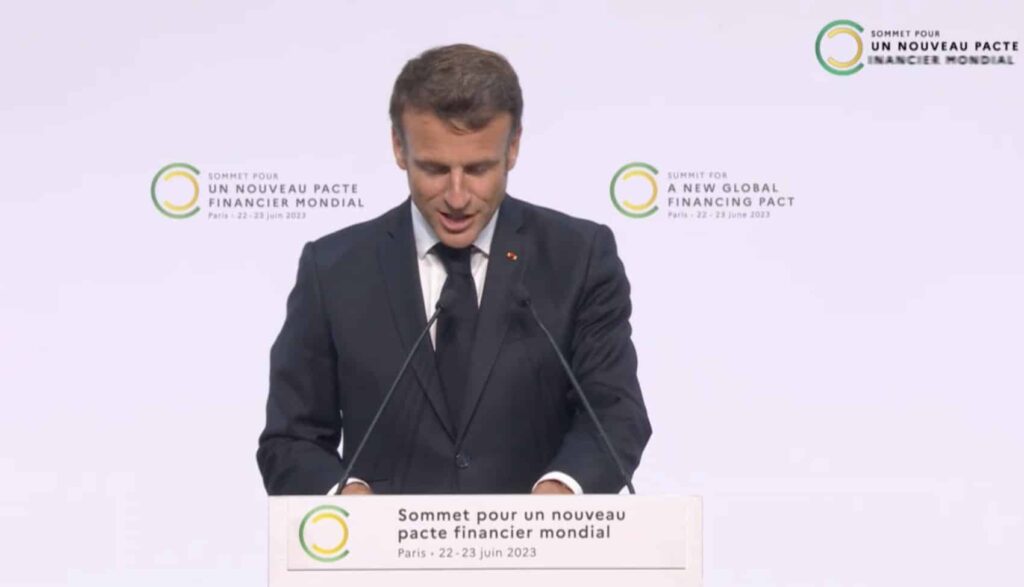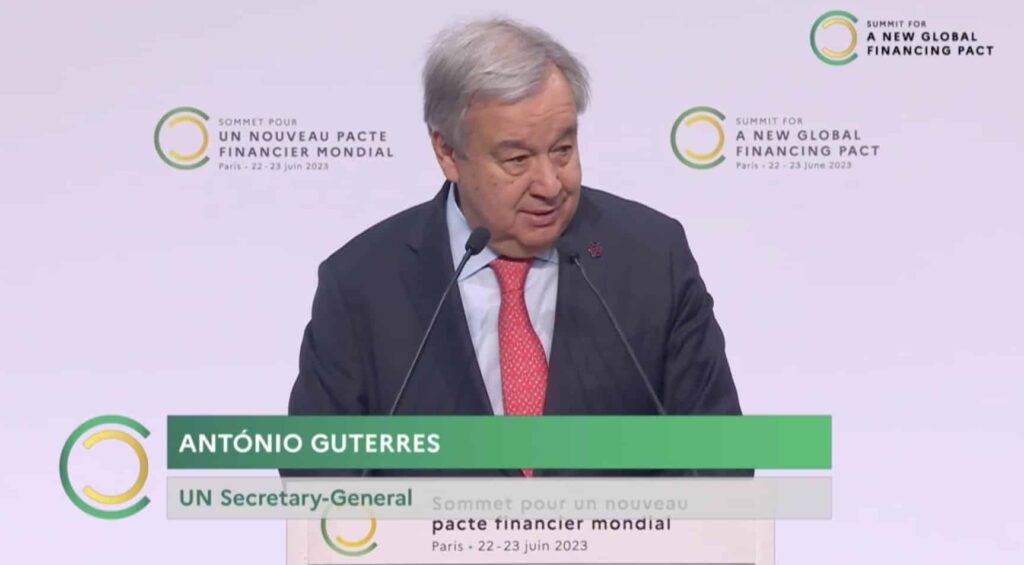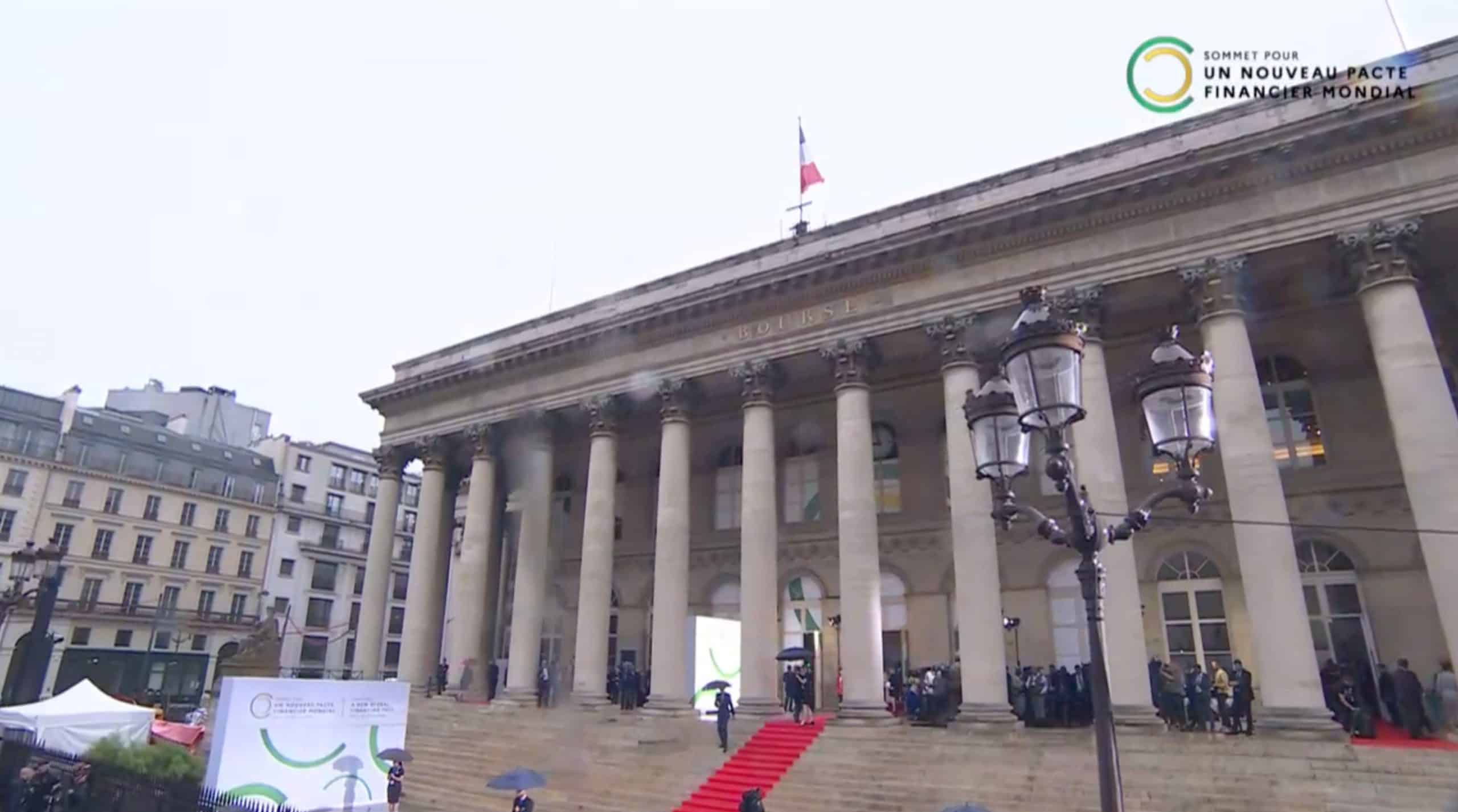It was an event of global proportions. Opening the Summit for a New Global Financial Pact, French President Emmanuel Macron called for an overhaul of the global financial system to resolve the current environmental and socio-economic crises. His proposal is both hopeful and controversial, marking an important page in the fight against economic injustice and climate degradation.
Towards a Sustainable Financial Future: Conclusions and Way Forward of the New Global Financial Compact
What is the aim of Day 2 of the Summit for a New Global Financial Pact?
The aim of Day 2 of the Summit for a New Global Financial Deal is primarily to conclude the discussions and dialogues initiated during the summit. The day begins with a prologue focusing on the Paris consensus, where several leaders of key international organizations will discuss the way forward for the coming months in various sectors, such as trade, philanthropy, agriculture, central banking and climate change.
The closing ceremony will present the conclusions of the round tables held during the summit. This ceremony will summarize the discussions, identify the next steps and highlight the commitments made by the various players.
What’s more, the day also includes a number of themed events designed to explore specific issues relating to global finance, health, sustainable development, the fight against poverty, and so on.
In short, the aim of the day is to summarize the summit discussions, highlight the decisions taken and chart a clear course for the future of the Global Financial Pact.
What’s on the agenda for Day 2?
Program for Day 2 of the Summit for a New Global Financial Pact: Friday, June 23
8:30 – 9:10 a.m. Prologue: The Paris Consensus: what directions for the coming months?
- Introductory remarks by Laurence Tubiana of the European Climate Foundation
- A question to Ngozi Okonjo-Iweala, Director General of the WTO: What consequences for the trade agenda?
- A question to Alvario Lario, President of IFAD: What impact can a fund like IFAD have?
- A question to Rajiv Shah, President of the Rockefeller Foundation: What role for philanthropists?
- A question for Matthias Cormann, Secretary-General of the OECD: What avenues does the OECD pursue?
- A question to Christine Lagarde, President of the European Central Bank: What role for central banks?
- A question to Sultan Al-Jaber, President of COP28: What are the lessons for COP28?
9:15 – 12:30 Closing ceremony
- Official welcome and family photo
- Presentation of round table conclusions
- High-level dialogue
- Press briefing
THEMED AND BRANDED EVENTS
- Over 80 events in all
- 50 themed events focusing on the Summit issues, held at the Palais Brongniart, the OECD and UNESCO.
A landmark event: « Special Finance in Common Event: Leveraging Public Development Banks’ Investments for the SDGs » held on June 22 from 6 to 7 pm at the Palais Brongniart – NEF.
On June 23, from 8am to 9am at the Palais Brongniart – Salle des Colognes, a special event co-organized by the WHO and the EIB entitled « Innovative finance to accelerate investment in primary health care and resilient health systems: the Health Impact Investment Platform (HIIP) » (by invitation only).
Our concluding thoughts for this historic summit
- Strengthen Regulatory Frameworks: Encourage stricter and more transparent financial regulations to foster a more stable and resilient global economic environment.
- Promote Sustainable Finance: Encourage greater investment in green and sustainable sectors, and encourage central banks to integrate climate risks into their monetary policy frameworks.
- Stimulate International Cooperation: Emphasize the importance of better cooperation and coordination between international financial institutions to address global economic challenges.
- Improve Global Financial Equity: Advocate for a more equitable distribution of global financial resources, particularly in favor of developing countries and marginalized populations.
- Fostering Financial Innovation: Promoting financial innovation, such as digital finance and fintech, which can offer new opportunities for financial inclusion and economic growth.
- Strengthening the Role of Development Banks: Emphasizing the importance of development banks in financing projects that support the Sustainable Development Goals (SDGs).
- Increasing Transparency: Emphasizing the need for greater transparency in international financial transactions to combat tax evasion, money laundering and other illicit activities.
- Encourage investment in primary healthcare: Recognize the need to increase investment in primary healthcare and resilient healthcare systems, particularly in light of the Covid-19 pandemic.
Necessary recognition of global vulnerabilities

In the face of escalating economic tensions and environmental crises, Macron has pointed to increasing global vulnerabilities. The reality is harsh but undeniable. Oil industry giants such as Chevron, Shell and BP made colossal profits of $55 billion in the second half of 2022, while governments continue to subsidize fossil fuels. We live with this distortion of the truth, we see it, and sometimes we are its victims.
Striking a balance between economic development and environmental protection


Macron asserted that nations should not be forced to choose between reducing poverty and respecting the environment. This is an immense challenge in a world where priorities often diverge. This first diplomatic principle evoked by the President highlights the need to strike an equitable balance between these two essential but often conflicting objectives.
The importance of national sovereignty in reshaping the global financial system
The President also stressed the importance of each country’s sovereignty. The new global financial pact should respect this fundamental principle to a greater extent, allowing each nation to chart its own course towards sustainable development. However, this point may also raise concerns about the risk of exacerbated economic nationalism hampering international cooperation.
Call for a significant increase in public funding
Agreeing with UN Secretary-General Antonio Guterres, who recently observed that « the international financial architecture has failed in its core mission », Macron called for a significant increase in public funding. In his view, this should entail greater mobilization of multilateral organizations, notably through the reallocation of special drawing rights. The ambition is clear: to reshape the financing structures in place since the Bretton Woods agreements which, after more than 80 years, now seem outdated in the face of today’s challenges.
Towards greater involvement of the private sector
Macron did not fail to involve the private sector, underlining its vital role in mobilizing funds for sustainable development. However, this raises a pertinent question: how can we effectively involve the private sector without letting profits get the better of the public interest?
Who is attending NPFM 2023 and why?
- Emmanuel Macron: As President of the French Republic, he has demonstrated strategic vision and political leadership.
- Vanessa Nakate: As a UNICEF ambassador, she is committed to the environment and children’s rights.
- Sir Nicholas Stern and Amar Bhattacharya: These two economists have provided analysis and recommendations on complex economic issues.
- Mohamed Bazoum, Denis Sassou-Nguesso, Cyril Ramaphosa, Macky Sall, Kaïs Saïed: these African political leaders have contributed unique perspectives and ideas on governance.
- Mia Mottley: As Prime Minister of Barbados, she has shown strong leadership on climate and sustainable development issues.
- Antonio Guterres: The UN Secretary-General has always offered a global perspective on international challenges.
- Nirmala Sitharaman and Janet Yellen: These economic leaders shared influential perspectives on global economic issues.
- Ajay Banga, Mafalda Duarte and Akinwumi A. Adesina: These heads of international financial institutions provided key perspectives on development financing.
- Melinda French Gates: As co-founder of the Bill & Melinda Gates Foundation, she has played a major role in promoting global equity.
- Ursula von der Leyen and Charles Michel: These European leaders have played a key role in the governance of the European Union.
- Yoshimasa Hayashi and Nana Addo Akufo-Addo: These political leaders brought their respective Asian and African perspectives to the table.
- Laurence Tubiana and Sultan Al-Jaber: These climate experts have played a major role in shaping international climate policy.
- Christine Lagarde, Matthias Cormann and Kristalina Georgieva: these financial leaders have influenced global economic policy.
- Rajiv Shah: As Chairman of the Rockefeller Foundation, he influenced philanthropy and development.
- Ngozi Okonjo-Iweala, Alvario Lario, Mark Carney: These leaders in international trade and finance have provided key perspectives on international trade and investment.
In conclusion: A search for solutions and a call to action
Concluding his speech, Macron stressed the need to focus on finding solutions, and called for widespread mobilization on behalf of our fellow citizens and our planet. Climate activist Vanessa Nakate echoed this need for action, stressing that climate financing must benefit those who have met their commitments.
Macron’s proposal is a historic call to overhaul a global system. It is a bold initiative that will not go unopposed. Nevertheless, the status quo is no longer a viable option. The balance between economic interest, respect for the environment and social equity is more than ever on the agenda. It’s an arduous task that will require compromise, boldness and innovation. But the first step has already been taken: the debate has begun.

